Psychotherapy Training Programs

The psychotherapy training at Indian Counselling Services is an engaging and comprehensive practical course for aspiring and practicing mental health professionals. Our comprehensive psychotherapy courses are designed to provide you with the expertise, skills, and ethical foundations needed to lead people on their journey to well-being. In our online Psychotherapy course, students can explore every aspect of clinical work in a supervised setting and receive guidance on becoming a psychotherapist
Eligibility
Aspiring Counsellors, Mental Health Therapist, Special Educators, Psychology Enthusiasts
Duration
1.5 Month
Credentials
- Certificate
- Letter of Recommendation
- Grade Sheet
Mode of Classes
Interaction Based Online Classes
Course Details
Psychotherapy is the treatment given to mentally ill and emotionally disturbed people through psychological techniques. It is also called clinical intervention since, in this approach, clinical psychologists utilize their professional competence and try to influence and bring changes in the behaviours of mentally disturbed and emotionally troubled people.
The primary objectives of a Psychotherapist are to change maladaptive behaviour patterns, enhance interpersonal and other skills, modify false assumptions about oneself and assist patients in re-establishing their self-confidence to manage their problems and adjust to the environment.
Professionals have established our psychotherapy training program to offer you an extensive understanding of the brain as well as psychiatric illnesses such as schizophrenia, dementia, bipolar disorder, and others. As a result, you’ll gain the knowledge and confidence to establish meaningful therapeutic relationships, accurately assess client needs, and implement evidence-based interventions.
Why We're the Best Choice for Psychotherapy Courses
Our psychotherapy training program establishes a strong basis in therapeutic principles and procedures. Participants will learn how to assess client requirements, create effective treatment plans, and apply a variety of therapeutic modalities to various clinical presentations. The program emphasizes developing strong therapeutic partnerships and providing compassionate and empathic client care.
- Lifetime Access To Study Materials
- E- Certificate / Hard Copy
- Letter of Recommendation
- Lifetime Learning Support
- Job Opportunities
- Get Notified Before Classes
- Online Resources
- Recorded Classes
- Get Identity Card
- Startup Support
- 24/7 Chat Facility
- Constant Academic Counsellor Support
Explore Our Government-Recognized Accredited Courses
Learn more about the fascinating realm of human behavior with our broad range of psychology courses. Whether you are looking for short-term or long-term diploma courses, we will provide valuable insights and practical applications to help you reach great heights in the future.













Our Courses
See What Our Students Are Saying
Trustindex verifies that the original source of the review is Google. Good course, helped me get insight into the practical application. But still the course content is very shallow. Could include some interesting activities, and expand the practical application-wise portion. Also i feel thw course is charged exorbidantly high.Trustindex verifies that the original source of the review is Google. The courses run by ICS is designed very well. This made it easer to learn. The coordination from the councillors were there to guide in every step. Thank you so much.Trustindex verifies that the original source of the review is Google. The course is excellent for anyone looking to delve deeply into psychology. I recently completed the course and was truly impressed. The staff is incredibly kind, and the teacher explains concepts in a simple and precise manner, ensuring everything is well understood. My experience with ICS was wonderful, and it proved to be an invaluable learning journey.Trustindex verifies that the original source of the review is Google. This is one of the best psychology course I have experienced. All mentor are well teaching technique and give us complete knowledge. Assignment they provide is very practical and helpful for our future. Overall I'm satisfied 😃Trustindex verifies that the original source of the review is Google. I am satisfied with the course and with the trainer. I would love to learn more with Indian counselling services.Great learning experience 😊👏Trustindex verifies that the original source of the review is Google. Hello everyone this is Jasmina .. recently i have completed a course on counselling practical internship program from Indian Counselling Services it was a very nice and well design, helpful course. It has helped me a lot.If u guys are looking for any online psychology course this is the best platform from where you can achieve and gain helpful knowledge and support.Thank you ICS.Trustindex verifies that the original source of the review is Google. Completing the Child Psychology and Counseling course with ICS was a great learning experience. It gave me practical knowledge to understand children's behavior, emotions, and growth. The course also improved my counseling skills to help children overcome challenges. Overall, it was well-organized and very helpful.Trustindex verifies that the original source of the review is Google. It was a great and helpful course, to expertise my knowledge in teaching profession. The content of the course CPI was very constructive and well organised, trainer was helpful and explained the content clearly and connect us to more real world studies, will look forward for more modules to add on in my Counselling program. Thankyou 🙂Trustindex verifies that the original source of the review is Google. I recently had the opportunity to join the internship at Indian counselling services, and that was absolutely amazing experience. I got to learn a lot from them... Got the hand on experience... Thanks to Indian counselling services for this amazing experience..
Meet Your Trainer For This Course

Arpita Roy Instructor
She is a licensed Clinical & Rehabilitation Psychologist. She has been trained at the Institute of Psychiatry – Centre of Excellence, Kolkata (IPGMER SSKM Hospital), and PGDRP in Rehabilitation Psychology from the University Of Calcutta (RCI), Currently attached to Government Hospitals. She has worked in both academics and clinical fields, which include Neuropsychiatric clinics, psychological treatment centers, de-addiction cum rehabilitation centers, schools, and NGOs. She has also been a former lecturer at the University of Calcutta.
“CLINICAL AND REHABILITATION PSYCHOLOGIST (RCI-Licensed)”
Empower your journey to becoming a psychotherapist!
Our comprehensive training program provides the flexibility of online learning. Study anytime, anywhere, and access a wealth of learning resources 24/7.

